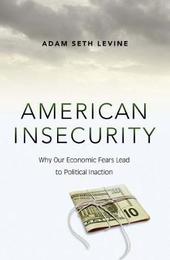
|
American Insecurity: Why Our Economic Fears Lead to Political Inaction
Hardback
Main Details
| Title |
American Insecurity: Why Our Economic Fears Lead to Political Inaction
|
| Authors and Contributors |
By (author) Adam Seth Levine
|
| Physical Properties |
| Format:Hardback | | Pages:320 | | Dimensions(mm): Height 235,Width 152 |
|
| Category/Genre | Microeconomics
Political economy
Public finance |
|---|
| ISBN/Barcode |
9780691162966
|
| Classifications | Dewey:336.73 |
|---|
| Audience | | Tertiary Education (US: College) | | Professional & Vocational | |
|---|
| Illustrations |
22 line illus. 30 tables.
|
|
Publishing Details |
| Publisher |
Princeton University Press
|
| Imprint |
Princeton University Press
|
| Publication Date |
25 January 2015 |
| Publication Country |
United States
|
Description
Americans today face no shortage of threats to their financial well-being, such as job and retirement insecurity, health care costs, and spiraling college tuition. While one might expect that these concerns would motivate people to become more politically engaged on the issues, this often doesn't happen, and the resulting inaction carries consequen
Author Biography
Adam Seth Levine is an assistant professor in the Department of Government at Cornell University. He has published in a variety of outlets such as the Journal of Politics, Political Analysis, Review of Behavioral Economics, and Political Communication. His work has won numerous awards, including the 2011 E. E. Schattschneider Prize. This prize is the highest dissertation award in the field of American government and is given annually by the American Political Science Association.
ReviewsWinner of the 2016 Best Book Award, Experimental Research Section of the American Political Science Association "Levine provides evidence that financially anxious people respond to their stress not by grouping together for action but by becoming less generous with their checkbooks and personal time."--Pacific Standard "This provocative volume identifies the 'self-undermining' political rhetoric inherent in the discussion of important economic issues as the driving reason contemporary working-and middle-class Americans have not produced political movements corresponding to the scale of the financial challenges they face... The research presented here is an interesting, well-defended addition to the literature on the nature of collective political action."--Choice "Powerful and highly accessible... Levine has succeeded in shining a light on the disconcerting reality that many citizens abstain from getting involved in addressing the very issues that deeply affect and permeate their everyday lives."--John V. Kane and Jason Barabas, Journal of Politics
|